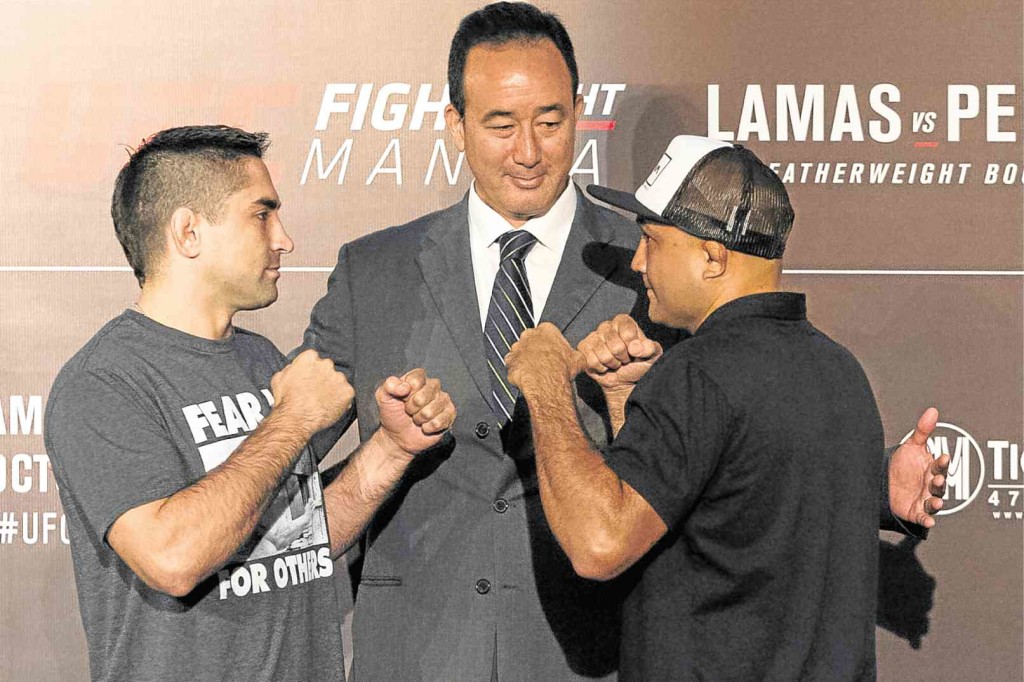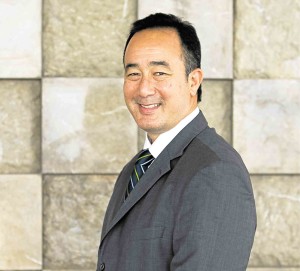Career opportunities

(From left) Ricardo Lamas, UFC General Manager Ken Berger, and BJ Penn promote the coming UFC Fight Night in Manila headlined by the featherweight bout of Lamas and Penn. This is the only UFC fight to be held in Asia this year. PHOTOS BY ALEXIS CORPUZ
Don’t think about the money.
It’s an ironic statement, coming from one of the top executives of a multibillion-dollar sports company–Ultimate Fighting Championship (UFC), the premier mixed martial arts promotion company.
But Ken Berger, executive vice president and general manager of UFC Asia for the past two years, told the Inquirer in a recent interview that anyone aspiring to make it big in the business of sports should focus more on opportunities rather than compensation.
“In the beginning, it can’t be about the money,” explained Berger, “It just has to be about opportunity. Grab it; take the bull by the horn. Get experience.”
And how exactly do you get that experience? Volunteer, Berger said.
“I suggest to college kids and even high school kids I talk to, get into volunteering and follow your passion,” said the 49-year-old father of two teenage boys.
“If it’s something you love, that experience will ultimately pan out,” he added.
Berger was in Pasay City to promote UFC’s “Fight Night Manila: Lamas vs Penn,” a five-round featherweight bout set on Oct. 15 at the SM Arena between former lightweight and welterweight champion BJ Penn and No. 4-ranked featherweight contender Ricardo Lamas.
It’s the country’s second time to host such event; for this year, it’s the only Fight Night in Asia.
Berger believes it was his 22 years of experience working in the sports industry that got him the job in UFC.
His career started in International Management Group, a global sports, talents and events management company, back in 1994. After that, he headed the Fifa World Cup marketing and event services operations for the 2002 Fifa World Cup Korea/Japan.
After the World Cup, Berger found himself without a project.
“So it was either look for a job or start my own sports marketing firm,” he said.
He settled for the latter, and put up Sports Marketing Japan (SMJ), which created sports-related content for mobile platforms.
Berger eventually sold the company to Japan’s largest entertainment production and talent agency, Yoshimoto Kogyo, after heading it for seven years.
Heeding his own advice, Berger said he did not hesitate to grab the opportunity to work with UFC in 2014 when the post was offered to him, even though he was aware of the challenges he would face when it comes to promoting the sport.
“We’re still not a mainstream sport. We’re still trying to get there, step by step,” he said. “And each market has its unique set of circumstances, whether it’s the [TV] broadcast partner, strength of local fighters, awareness of mixed martial arts, strength of the UFC brand. So each market is very targeted in terms of how we attack it.”
Berger said that aside from Korea and Japan, the group discovered that the Philippines had high appreciation for the sport, despite it being a boxing-loving nation.
“The [Filipino] fans are really knowledgeable, intense and interactive,” Berger said. “Understanding, appreciation of combat sport is a great base, and we have that in the Philippines with the boxing community.”
What he’d like to work on, though, is a program to develop more local fighters, which would, in turn, help further promote UFC.
“We have a partnership with a company which creates UFC gym products, so we have 150 gyms in US, Sydney, Vietnam. We hope to have great news on that front in the next month or so in the Philippines, so stay tuned for that one,” Berger said.
But, what really makes mixed martial arts—and UFC—click is the fact that fighting is “something innate” in all of us, said Berger.
“We all have been fighters at one point in our lives,” he said. “Maybe not athletically, but every day, we are fighting for something.”

